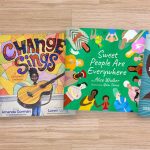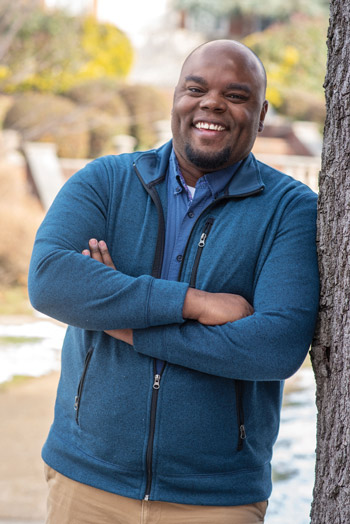
Black Boy Joy: 17 Stories Celebrating Black Boyhood (Delacorte Press, 2021) is a collection of stories, comics, and poems for middle grade readers celebrating the wonder, fun, and magic of growing up a Black boy. As one of the characters says: “The world is harsh. Find your joy, Fortitude, and it’ll be your night-light when everything is dark.” Edited by Kwame Mbalia, the anthology features his work along with that of sixteen other acclaimed Black male and non-binary authors. Their pieces take readers on imaginative journeys that venture down pathways leading to superheroes and science, space travel and skateboarding—but always end in joy.
The collection landed on numerous “Best Book of 2021” lists—including those of the New York Public Library, School Library Journal, and the Washington Post—and includes the work of writers B. B. Alston, Dean Atta, P. Djèlí Clark, Jay Coles, Jerry Craft, Lamar Giles, Don P. Hooper, George M. Johnson, Varian Johnson, Kwame Mbalia, Suyi Davies Okungbowa, Tochi Onyebuchi, Julian Randall, Jason Reynolds, Justin Reynolds, DaVaun Sanders, and Julian Winters. It also features an attention-grabbing, luminous cover by Caldecott Medal-winner Kadir Nelson.
Here, Lisa Bullard talks with Mbalia about the overall collection along with the importance of community, the power of stories, and the need to center joy.
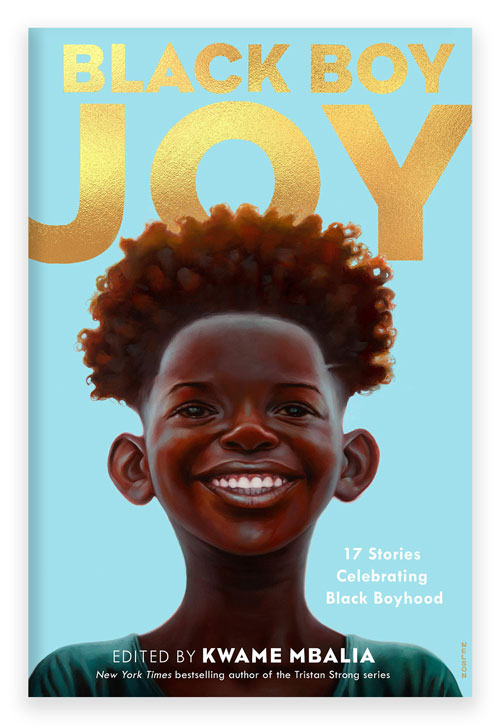
Black Boy Joy flows seamlessly from one piece to the next, and each piece sounds its own vibrant note, but when they’re all brought together as a collection, it feels transformative. Can you tell readers a bit about how the project came about? What was your original inspiration?
The book really came about because I wanted to hand something to Black children that said, “We see your joy even though it seems everyone only wants to see your pain.” It was the summer after Derek Chauvin murdered George Floyd, and after Breonna Taylor was murdered. I wanted a book that could be used by children and their families as a way to navigate from a plethora of different emotions toward joy.
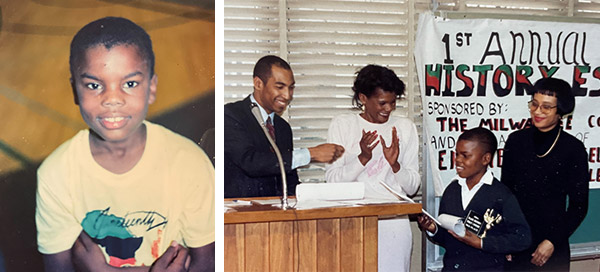
The book really came about because I wanted to hand something to Black children that said, ‘We see your joy even though it seems everyone only wants to see your pain.’”
I won’t ask you to single out a “favorite” piece in the collection—that’s too much like asking a dad to choose his favorite kid! But I would love to know if there is a piece, or an element of a piece, that ended up being a big surprise for you?
The biggest surprise for me was the submissions we received for the contest we ran. We saved two spots in the anthology for writers who’d never been published in the middle grade space, and I was overwhelmed by the sheer number of brilliant stories. It was hard to pick only two, but Don P. Hooper’s story and DaVaun Sanders’ story were both excellent and fit the themes perfectly.
Black Boy Joy Contributors
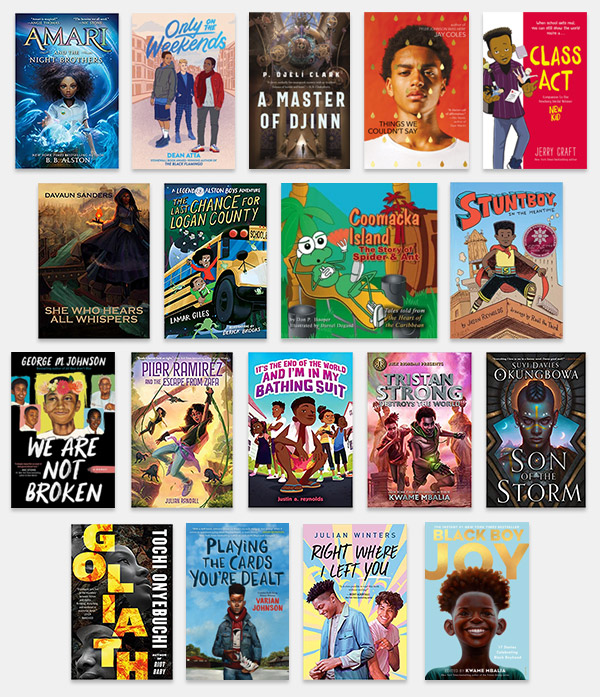
Black Boy Joy has been out in the world about eight months now. What kind of feedback have you received from your readers?
I love getting photos from parents and families that show their young readers engrossed in the book, and I also love how every student I talk to has a different story that has become their favorite. It’s one of the joys of doing an anthology—there’s something for everyone.
It’s one of the joys of doing an anthology—there’s something for everyone.”
You are also the author of two middle grade novels that came out in 2021: Tristan Strong Keeps Punching (Disney Hyperion) and Last Gate of the Emperor (from Scholastic, along with co-author Prince Joel David Makonnen). For Black Boy Joy, you served as both a writer/contributor as well as the editor. How was it different to take on the role of editor? Have you thought about putting together another collection?
Well, I didn’t have to write as much; that was a plus. But there were logistics to manage and communications to handle that I wouldn’t normally deal with. But overall, it was a unique and wonderful experience, and if the idea comes for another anthology, I’d certainly pitch it.
Watch Our Lifting Voices Webinar With Kwame Mbalia and Black Boy Joy

Lifting Voices: Celebrating Black Boy Joy
What advice do you have for your young readers who would also like to become writers?
The advice I give to young writers varies from day to day because it’s such an individual experience. What works for you might not work for me and vice versa. But something that I think everyone can benefit from is a community of people who are excited to push you on your path and who thrive when you push them. Finding a group of writers to talk to, commiserate with, and even write with can be a delightful boost.
Something that I think everyone can benefit from is a community of people who are excited to push you on your path and who thrive when you push them.”
What advice do you have for educators hoping to cultivate creativity in their students?
Find what your students are passionate about and craft exercises and lessons around them. Is there an anime they like? Talk about character growth and antagonists. Is there a video game they enjoy? Do a writing exercise where you design an encounter or quest with branching storylines depending on choice.
Connect With Kwame Mbalia
One of the unifying elements between Black Boy Joy and your middle grade novels is the idea that stories are critical in shaping who we are; you make it clear that stories are what we carry from one generation to another. Can you talk a little more about the power of stories in your own life?
As a group of people whose stories were often erased and who struggle to get their histories told accurately in public settings, stories were often the means of giving lessons, passing warnings, and yes, entertaining. A good story enthralls and captivates and lingers long after it’s over. I think of stories my mother told me about our family, or that my father told me about survival. I also think of stories I discovered wandering through libraries and bookstores. Stories are transformative, both for the listener and the speaker.
Stories are transformative, both for the listener and the speaker.”
What kinds of books can your fans look forward to seeing from you in the future?
More contemporary fantasy, more futuristic science fiction, and more [about] Black kids living their best life.
What are the best ways for readers to connect with you or to follow you on social media?
I’m on Twitter @ksekoum, and you can also check out my website, kwamembalia.com.
Is there anything else you’d like to add?
Happy reading!






